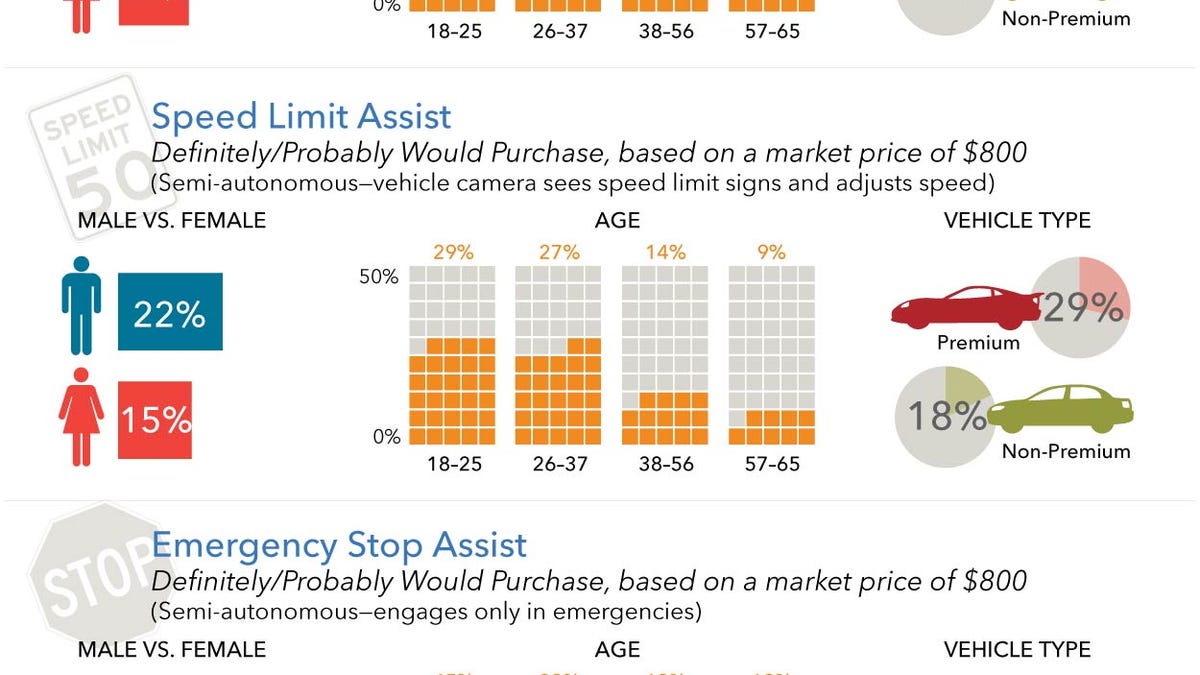Many car buyers show interest in autonomous car tech
A J.D. Power and Associates study found that approximately a third of car buyers are interested in autonomous vehicles, but fewer are willing to pay for it.

A fully autonomous vehicle is looming on the horizon, but do car buyers actually want this cutting-edge technology? And more importantly, will they be willing to pay for it? For approximately a third of car buyers, the first answer is yes, according to J.D. Power and Associates.
The research company conducted a study of 17,400 vehicle owners to measure interest and purchase intent for emerging automotive technologies. Participants were surveyed on the likeliness they would buy current and future autonomous safety technology, such as crash avoidance systems and fully self-driving vehicles. Not surprisingly, the interest participants showed in shelling out the dough depended largely on gender, buying category, and age. And the more cutting edge the technology, the less eager the buyer.
Who will pay for what?
As one might guess, the more money you have, the more interested you were in opening your wallets for autonomous vehicles. More than a third (37 percent) of all survey responders initially said they would be interested in purchasing a fully self-driving car. But price is definitely a factor that will influence that desire.
That number of willing car buyers dropped to 20 percent once they learned the technology would cost an additional $3,000. However, even with a hefty premium, 31 percent of high-end car buyers were still interested in buying that feature.
The study also found that the technology appeals to men more than woman. A quarter of the male vehicle buyers willing to pay for a fully autonomous vehicle, while only 14 percent of women wanted the feature. The gender gap narrowed a bit when it came to less intrusive and more mainstream autonomous technology. Men were nearly 50 percent more likely than women to want Traffic Jam Assist (22 percent compared with 15 percent), Emergency Stop Assist (28 percent compared with 19 percent), and Speed Limit Assist.
Interest in autonomous technology definitely skewed younger, with 45 percent of vehicle owners ages 18-35 saying they would buy Emergency Stop Assist compared with only 18 percent of buyers age 57-65. Surprisingly, only 37 percent of the youngsters said they would buy a fully autonomous vehicle, although the $3,000 premium may have had something to do with it. And older buyers wanted nothing to do with the technology, with only 9 percent answering they would buy a self-driving car.
Build it and they will come
These findings could bolster and encourage auto manufacturers in their production of vehicles with semi-autonomous technology. Ford has found that car buyers are adopting advanced safety features, such as its Blind Spot Information System, at higher than anticipated take rates. Some of the features described in the survey aren't as future tech as they may seem and are slated for production. BMW and Audi will offer Traffic Jam Assistant, a technology that can take over driving in stop-and-go traffic, within the next few years, and many vehicles already offer versions of Emergency Stop Assist. Cadillac recently disclosed that it is developing a semi-autonmous vehicle.

